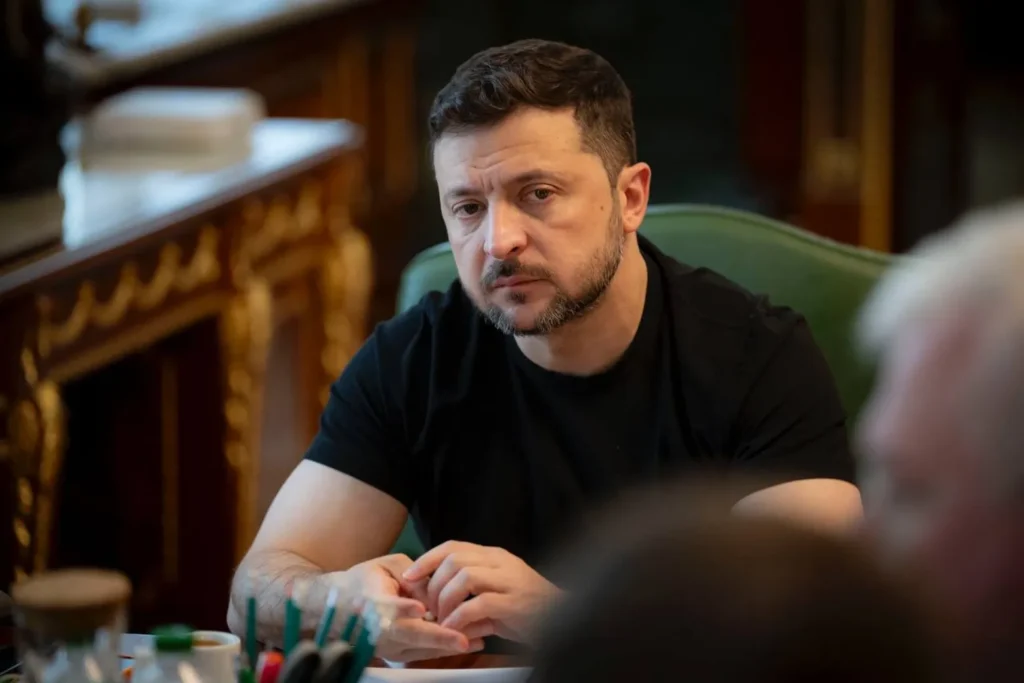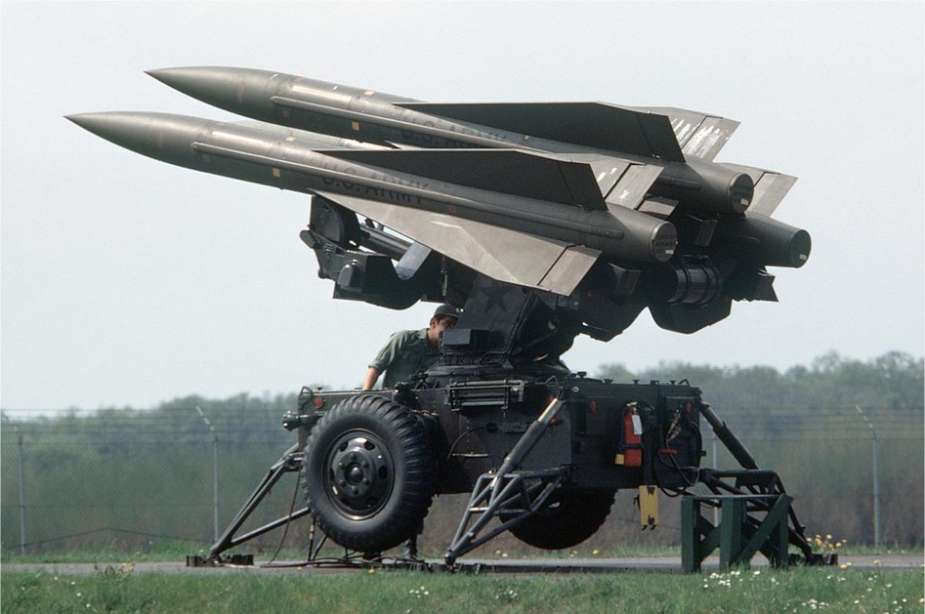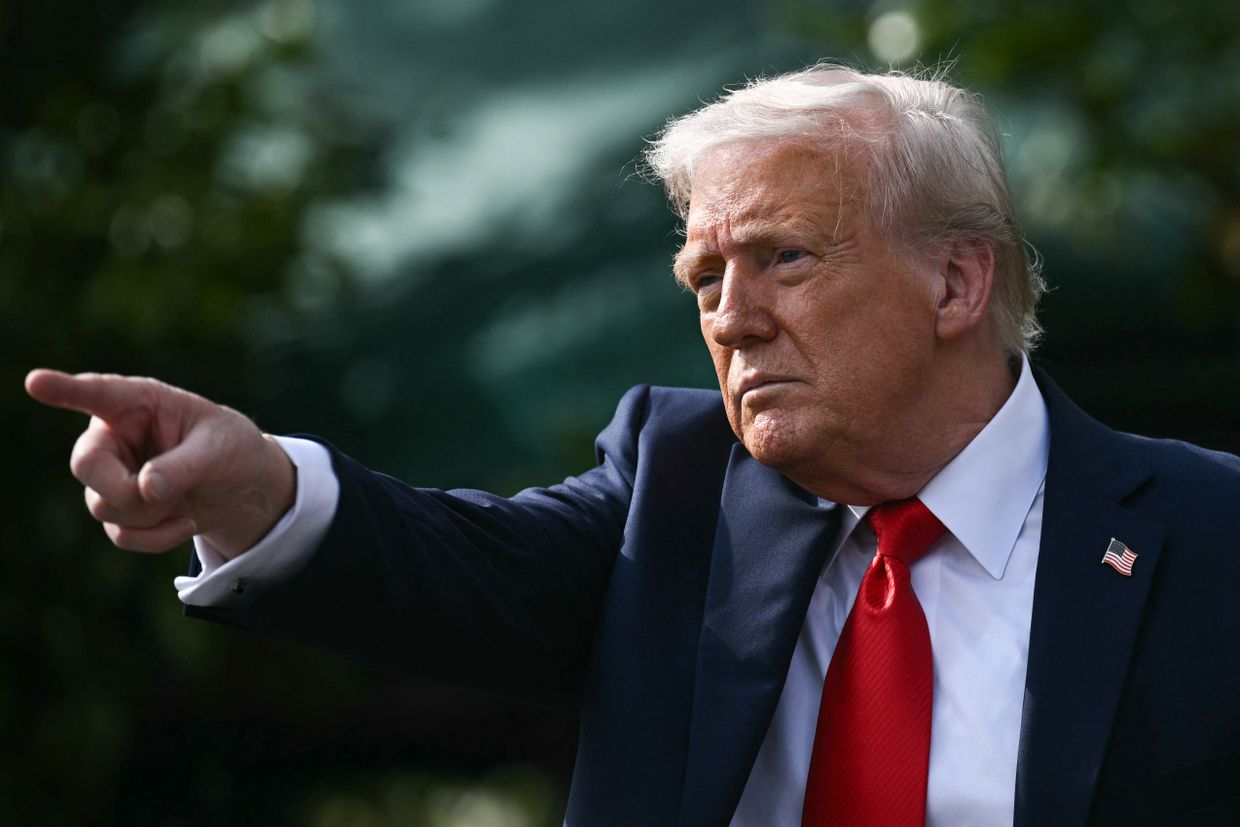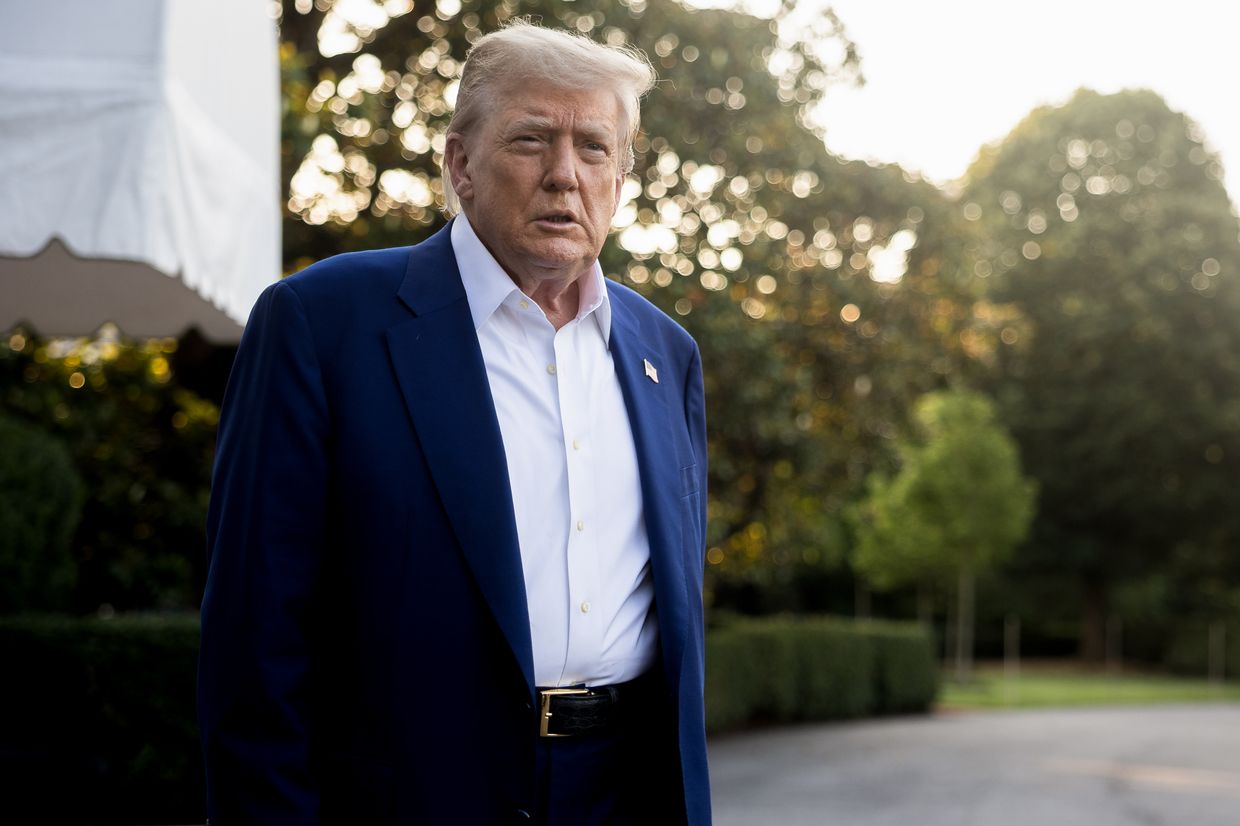Europe Made Major Trade Concessions to Trump. How Did That Happen?

© Tierney L. Cross/The New York Times


© Tierney L. Cross/The New York Times


© Todd Heisler/The New York Times


© Martial Trezzini/Keystone, via Reuters


© David Guttenfelder/The New York Times


© Isabel Mateos/Associated Press


© Robin Van Lonkhuijsen/ANP, via Agence France-Presse — Getty Images


© Arindam Shivaani/NurPhoto, via Getty Images


© David Ryder/Getty Images


© Jason Andrew for The New York Times


Ukrainian President Volodymyr Zelenskyy announced on 24 July that the United States has agreed to purchase Ukrainian-made drones, with potential contracts worth $10-30 billion under discussion.
Ukraine has expanded its domestic drone production since the Russian invasion. The country planned to produce millions of drones annually, using a combination of mass production in factories and small-scale workshops, often repurposing commercial drone parts and innovating with battlefield experience.
Until recently, Ukraine had a ban on exporting drones abroad, focusing on domestic military use, but it is now considering or beginning to allow drone exports to its allies to support its drone industry and military partnerships.
“We have an agreement with America, with President Trump, that they will buy drones from us,” Zelenskyy told journalists during a briefing. “I have set the task for Umerov, Shmyhal and Kamyshin. They will deal with this. It is very important to prepare this contract for 10-20-30 billion dollars.”
The president has tasked National Security and Defense Council Secretary Rustem Umerov, Defense Minister Denys Shmyhal, and presidential advisor on strategic issues Oleksandr Kamyshin with preparing the contracts.
Zelenskyy first disclosed American interest in Ukrainian drone technology on 16 July, when he revealed discussions with President Trump about bilateral defense procurement.
“There are many drones that only we have. We are discussing this with President Trump. I told him that I really want to buy things from you that only you have. He told me that America wants to buy Ukrainian drones,” Zelenskyy said in an interview with Newsmax correspondent Shelby Wilder in Kyiv.
The Ukrainian leader framed the potential deal as part of broader defense cooperation, emphasizing Ukraine’s need for American Patriot air defense systems.
“I really want America to help us protect our sky. This is very important,” Zelenskyy said during the 16 July interview.
Ukraine urgently needs these systems to counter Moscow’s escalating long-range strikes. The US along with Germany has agreed to deliver five Patriot systems, with Germany, Norway, and other allies financing and facilitating the deliveries. The US has already sent three systems and is involved in ongoing discussions to provide up to 17 in total.


© State Department


© Fred Ramos for The New York Times


© Seung-il Ryu/NurPhoto, via Getty Images


© Philip Fong/Agence France-Presse — Getty Images




© Ian Austen/The New York Times


The US State Department has approved the sale of two military assistance packages to Ukraine totaling $322 million, the Pentagon announced on 23 July.
The approval covers $172 million in HAWK Phase III missile system support and $150 million for Bradley infantry fighting vehicle restoration services.
According to Pentagon press releases, the Ukrainian government requested the purchase of goods and services for maintaining HAWK missile systems. The $172 million package includes spare parts for HAWK systems, missile complex repairs, testing and auxiliary equipment, storage containers and related spare parts storage equipment, spare parts for MIM-23 HAWK missiles and missile repairs, plus additional logistics and program support elements.
The second package addresses Ukraine’s request for equipment and services to restore Bradley infantry fighting vehicles, along with technical assistance and training for Ukrainian military personnel. This component carries a $150 million price tag, Pentagon officials said.
US officials stated the packages will enhance Ukraine’s capacity to address current and future threats.
“Ukraine will not have difficulties implementing these goods and services into its armed forces,” the Pentagon press service reported.
The approval comes weeks after President Donald Trump confirmed on 14 July that the US will provide Ukraine with weapons worth “billions of dollars.” According to Trump, European NATO allies will purchase and distribute the equipment, including up to 17 Patriot air defense systems currently being prepared for shipment to Ukraine.
Read also:
You could close this page. Or you could join our community and help us produce more materials like this.
We keep our reporting open and accessible to everyone because we believe in the power of free information. This is why our small, cost-effective team depends on the support of readers like you to bring deliver timely news, quality analysis, and on-the-ground reports about Russia's war against Ukraine and Ukraine's struggle to build a democratic society.
Become a patron or see other ways to support.


© Vincent Alban/The New York Times


© State Department


© NOAA, via Associated Press


© NOAA, via Associated Press


© Chris Young/The Canadian Press, via Associated Press


© Brendan Hoffman for The New York Times


© Wes Frazer for The New York Times


A global law enforcement campaign has dealt a blow to the pro-Russian cyber army known as NoName057(16). Europol confirmed that about 20 countries helped dismantle the network behind thousands of attacks on Ukraine’s supporters.
Europol reported that between 14 and 17 July, authorities from 12 countries launched Operation Eastwood. Europol and Eurojust coordinated the joint crackdown. The effort reportedly dismantled major parts of the pro-Russian cyber army’s infrastructure, including hundreds of systems.
Germany issued six arrest warrants for suspects based in Russia. Two are accused of leading the group’s activities. Spain issued another arrest warrant. France and Spain also reported one arrest each. All suspects are internationally wanted.
Authorities carried out 24 house searches and questioned 13 individuals across Europe. In Spain alone, 12 searches took place. Investigators also notified over 1,000 individuals believed to support the cyber group. Fifteen of them were administrators.
Other attacks struck during the European elections. Swedish government and banking websites were affected. In Switzerland, NoName057(16) launched attacks in June 2023, during a speech by Ukraine’s president to the Joint Parliament. Another wave occurred in June 2024 during the Peace Summit for Ukraine at Bürgenstock.
The most recent attack linked to the group targeted the NATO summit held in the Netherlands in June 2025. Europol notes that although the attacks caused disruption attempts, none led to substantial outages.
Europol identifies NoName057(16) as an ideological cyber network that operated without formal leadership. The group recruited mostly Russian-speaking sympathizers, many with little technical knowledge. Its structure relied heavily on gamified propaganda and incentives.
Volunteers received cryptocurrency payments and recognition through online shout-outs, badges, and leaderboards. Europol notes this method especially appealed to younger users who felt emotionally involved in Russia’s political narratives.
To simplify participation, NoName057(16) distributed guides and tools like DDoSia. Europol also launched a prevention campaign warning suspected supporters of their criminal liability, delivered via the same communication platforms.


© Mario Tama/Getty Images


© Gary Hershorn/Getty Images


© Isabelle Souriment/Hans Lucas, via Reuters


© Isabelle Souriment/Hans Lucas, via Reuters


© Evaristo Sa/Agence France-Presse — Getty Images


© Pool photo by Leon Neal


© Carlos Osorio/Reuters


© Bryan Anselm for The New York Times


© Carlos Osorio/Reuters


© Ingmar Nolting for The New York Times


© Doug Mills/The New York Times


© Eric Lee/The New York Times


© KT Kanazawich for The New York Times


© Eric Lee/The New York Times


© The New York Times


© Diana Vyshniakova/Alamy


© Kenny Holston/The New York Times


U.S. President Donald Trump is considering sending Ukraine an additional Patriot air defense system, a move that would mark his administration's first major weapons transfer to Kyiv, the Wall Street Journal (WSJ) reported on July 8, citing two defense officials.
The report is the latest in a series of contradictory messages from the Trump White House in recent days regarding military aid to Ukraine. While the Pentagon on July 2 announced a halt in weapons shipments to Kyiv due to dwindling U.S. stockpiles, Trump later claimed he wasn't responsible for the decision and wanted to send more weapons to Ukraine.
A U.S. defense official told the WSJ that Trump has asked the Pentagon to look into options for supplying Ukraine with more arms, including a Patriot air defense system. Officials are also reportedly exploring whether other nations can send Patriots to Kyiv.
The claim dovetails with recent media reports about the administration's plans to bolster Ukraine's air defenses. Axios reported on July 8 that the White House is pursuing a plan to have Germany sell another Patriot battery to Ukraine, with the U.S. and European allies splitting the cost of the purchase. Sources told the outlet that Trump also pledged to send 10 Patriot interceptor missiles to Kyiv.
If the U.S. provides Ukraine with an additional Patriot system, it would mark the first time Trump has approved a major military aid package to Kyiv that wasn't previously greenlighted by former U.S. President Joe Biden.
Washington has thus far provided Kyiv with three Patriots, a former Pentagon official told the WSJ. Germany has also sent three, while a group of European countries provided one. According to the official, not all systems are in use at the same time due to maintenance issues.
The U.S.-made air defense systems are in high demand around the world. Each system consists of two or three launchers, a radar, a command and control element, and interceptor missiles. Patriot missiles are also in short supply globally: Ukraine faces an urgent need for the munitions amid increased Russian aerial attacks, and the Guardian reported on July 8 that even the U.S. has only 25% of the interceptors required by its defense readiness plans.
According to one of the officials who spoke to the WSJ, the U.S. military would be able to supply an additional Patriot to Ukraine if ordered by the White House.
 The Kyiv IndependentAnna Fratsyvir
The Kyiv IndependentAnna Fratsyvir


© Doug Mills/The New York Times


Ukraine's current ambassador to the United States, Oksana Markarova, will be replaced in the near future, Foreign Minister Andrii Sybiha confirmed in an interview with Ukrainian Radio on July 8.
Earlier on July 8, a source in the Presidential Office told the Kyiv Independent that President Volodymyr Zelensky had informed Markarova of her pending dismissal.
"We can expect about 20 decrees dismissing and appointing new heads of foreign institutions," Sybiha said, specifically mentioning the U.S. as one of the planned replacements.
In his comments, Sybiha described Markarova as "one of our most successful ambassadors."
"She is extremely effective and charismatic, but surely every diplomat has a rotation cycle," he said. "I can confirm that the Ukrainian president's vision is to carry out rotations in all countries, both G7 and G20. That is, first and foremost, to strengthen these countries, in particular the U.S. track."
Zelensky and Sybiha on June 21 announced plans to overhaul Ukraine's diplomatic corps, teasing major personnel changes in a bid to secure better military aid packages and other support from international partners.
Zelensky discussed replacing Markarova specifically in a recent phone call with U.S. President Donald Trump, a source in the President's Office told the Kyiv Independent on July 7.
There are multiple "strong candidates" in the running to replace Markarova, the source said. Prime Minister Denys Shmyhal, Deputy Prime Minister Olha Stefanishyna, Defense Minister Rustem Umerov, and Energy Minister Herman Halushchenko are among the candidates, Bloomberg previously reported.
In his evening address, Zelensky said that a meeting with all Ukrainian ambassadors is scheduled for July 21. It was not immediately clear as to when the changes to the posts may take effect.
Markarova has served as Kyiv's ambassador to Washington since April 2021, and played a central role in coordinating U.S. military and financial support during the early phases of Russia's full-scale invasion.
The announcement of her dismissal comes at a high-stakes moment in relations between Kyiv and Washington. The U.S. Defense Department recently paused shipments of critical weapons systems, including Patriot air defense missiles and precision-guided munitions, even as Ukraine faces intensifying Russian attacks.
 The Kyiv IndependentAnna Fratsyvir
The Kyiv IndependentAnna Fratsyvir